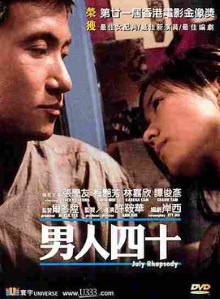
So this got bumped up the list a whole lot sooner than I expected. I have watched this one before and had a high regard for it back then. As with Summer Snow, finding a copy of it anywhere proved to be impossible and we resorted to watching a YouTube version. July Rhapsody is also notable as being the last film appearance by Anita Mui before her death in 2003.
Middle-aged Lam Yiu-kwok is a teacher in the same high school that he used to attend. Meanwhile most of his other classmates have gone on to high earning careers. His depression worsens when his wife Chan Man-ching who was also his classmate reveals that she has been in contact with their old teacher. This teacher used to be Lam’s favorite and inspired his life-long love for classical Chinese literature but had an affair with Chan while she was still a student. Now he in the terminal stages of a disease and is all alone so Chan wants to help take care of him, which infuriates Lam. At the same time, he learns that a talented but irreverent student, Woo Choi-lam, in his class has a crush on him. Perhaps feeling disappointed in his wife, he allows himself to be tempted and starts going out with her.
Lolita-type scenarios are frowned on nowadays as an escapist middle-aged male fantasy with little grounding in reality. The multiple themes in July Rhapsody subvert that in some ways but reinforce it in others. My wife complained that present events in the film track past events too closely to the extent that it feels almost absurd, which is true. Yet it could be argued that Lam is constantly conscious of the parallel himself and the feeling that he is owed this is perhaps one reason why he allows himself to be drawn in. The fact that the young girl Woo is so different from his own wife throws a wrench into things yet the fact that Woo is confident and blasé about the affair serves to exonerate Lam for his part in it which feels a bit under-handed. It allows the audience to continue to blame his old teacher yet also continue to be sympathetic towards Lam himself.
Even if it does too much to absolve Lam of guilt, I do think that this is an excellent portrayal of a man’s mid-life crisis. All of the details feel authentic down to his mixed feelings when meeting his high school friends such as his insistence on paying for his share of the meal. It’s also insightful of the scriptwriter Ivy Ho to see that a high school teacher is just about the perfect choice of career for the story especially as in Chinese culture teachers are supposed to be venerated and yet aren’t paid all that well. Or as we put it in English, those who can, do; those who can’t, teach. My Chinese is awful so I can’t judge the quality of the literary allusions that interspersed throughout the film but I can see how it helps lend weight to the work. At the same time, as much as Lam loves Chinese literature and the film admires him for it, it is also quite obvious how useless it is in getting ahead in everyday life. The character of Woo perfectly encapsulates these conflicts. She is obviously talented enough to be a good writer if she wants to be yet she is also savvy and worldly enough to disdain it and instead drops out of school to run her own business. It really is an impressive script full of subtle themes and references.
Though Summer Snow and July Rhapsody are companion pieces, I note that this film is completely serious in tone without the zany gags that made the earlier film so much of a product of its era. There are some awkward issues with how it tries to make Lam’s eldest son part of the story but on the whole I consider this to be the far superior film.